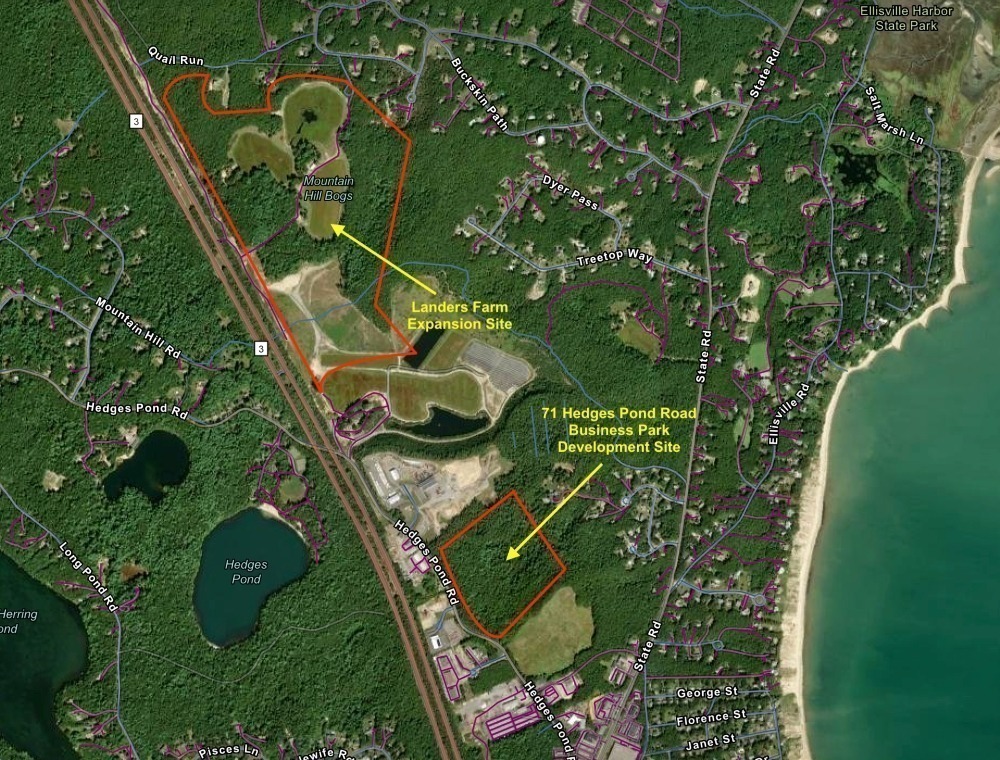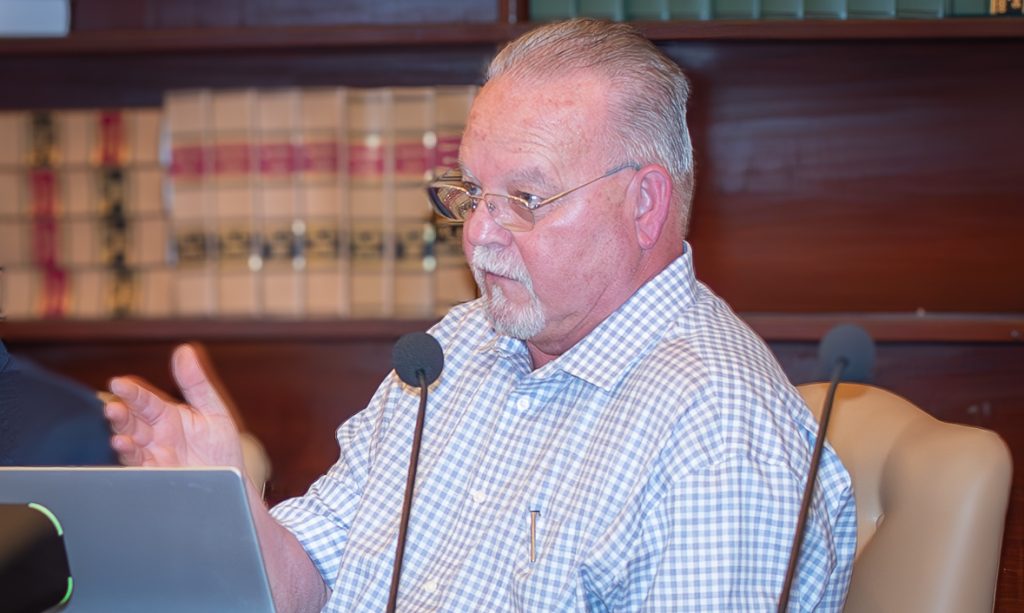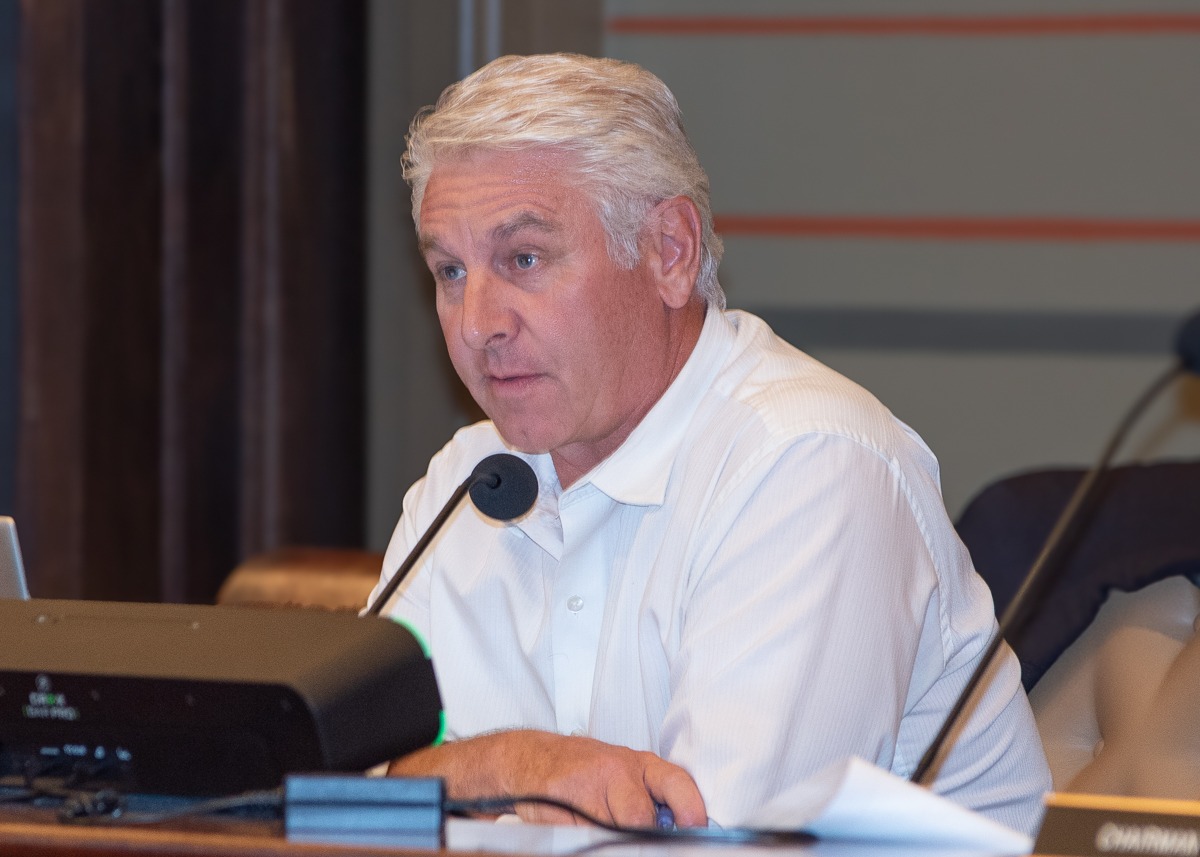It was a roller coaster ride for opponents of sand and gravel mining in Plymouth Wednesday, when the Planning Board endorsed development of a business park off Hedges Pond Road, then soundly rejected a proposal to expand a cranberry farm down the street.
Both projects call for massive excavation and removal of sand and gravel from their respective sites.
Over the objections of many residents who spoke at the meeting, the board voted unanimously to support Standish Investment Group’s plan to build a business park at 71 Hedges Pond Road that will include a 176,000-square-foot warehouse with multiple loading docks, a 75,000-square-foot recreational facility with two ice hockey rinks and two 20,000-square-foot buildings suitable for wholesale operations, currently noted as a lumber yard on the documents. It also calls for the removal of 270,000 cubic yards of sand and gravel.
Then, to the delight of those same residents, the board voted unanimously to reject a plan by P.A. Landers Inc. to remove 2 million cubic yards of sand and gravel from the 100-year-old cranberry farm it owns off Hedges Pond Road, ostensibly to build a new bog, expand an existing one, and dig a new six-acre reservoir to help manage water on the property.
“I see no public benefit here,” Planning Board member Tim Bennett said of the Landers project. “Unlike the 71 Hedges Pond Road project, which I believe has tremendous public and economic benefits.”
The business park site at 71 Hedges Pond Road was part of a larger tract owned by the town for decades and managed by the Conservation Commission for open space. In the fall of 2018, Town Meeting voted unanimously to re-zone a portion of the land to create the Cedarville Village Enterprise District and allow for light industrial and commercial uses to help increase the town’s commercial tax base and create jobs. The balance, some 130 acres, remains conservation land and serves as a buffer between the development site and nearby neighborhoods.
“This site was meant to be developed,” said Planning Board member Tim Grandy. “It was a unanimous vote by Town Meeting and also a unanimous voted by the Cedarville Steering Committee at the time.”
But times have changed. The current Cedarville Steering Committee held several meetings with the development team and residents, then voted to oppose the current project because of the earth removal planned and the added truck traffic on already congested streets.

Steering committee members Patricia Adelmann and Tess Brennan spoke at Wednesday’s meeting, urging the Planning Board to oppose the business park and the Landers plans. “Everyone is very frightened about this,” Brennan said. “It will destroy our quality of life.”
The proposed business park site is heavily wooded rolling hills. To create a level tract suitable for the buildings and infrastructure the developer initially proposed to regrade the area and remove 350,000 cubic yards of sand and gravel. After the Planning Board first discussed the project in September it asked for an independent engineering review to determine if the earth removal could be reduced.
The town hired Environmental Partners, private company, to conduct that review. The firm suggested that changes to the design could reduce the sand and gravel removal by 20 percent. Simultaneously, the developer’s engineer, Kevin Flaherty of Flaherty & Stefani, went back to his drawing board and changed the slope of the access road and the finished grade elevation of the park. That reduced the earth removal amount by 80,000 cubic yards, or about 22.8 percent.
Even with earth removal down to 270,000 cubic yards, many people at the meeting said the work would still threaten the groundwater aquifer, which is the sole source of public drinking water in Plymouth, Carver, and portions of Kingston, Bourne, Plympton, and Wareham.
Flaherty said the opposite is true in this case. While a lot of material will be removed from the site, he said, much of the land will be regraded and filled, with the lowest points raised up by 36 feet from current conditions. “We are adding 36 feet of filtration by increasing the separation from the ground water. We are not cutting into the ground water.”
Board member Bennett, who is a professional land surveyor, agreed with Flaherty’s point. “I took a very close look at the plans, and there is more protection for the ground water. The science, the engineering, the facts say that. It’s the truth,” Bennett said.

After more than an hour of public comments, with all but one speaker opposed, Planning Board chair Steven Bolotin narrowed the discussion. He noted that the Planning Board had no power to block the development. Its only role was vote on two issues: whether it makes sense to build the park as a “unified complex,” meaning the buildings can share parking, utilities, and infrastructure; and whether the planned earth removal is reasonable and “incidental” to the overall project and doesn’t require a separate special permit.
On both points, Bolotin said he was satisfied that the project can move forward as planned. “It would be inappropriate for me to substitute my amateur judgement for that of a licensed professional whom this board asked to provide that guidance,” he said regarding the scope of earth removal.
The board voted to recommend the town issue permits to build the park, with 20 specific conditions drafted by the town’s planning department to regulate the project, including limiting earth removal to two years, periodic inspections and reports to ensure the project is complying with the permit. Truck traffic would be limited to 40 roundtrips per day, with construction allowed Monday through Friday from 7 a.m. to 3 p.m.
If the project moves forward, and the land is sold to the Standish Investment Group, $2 million from that sale will go to the town, earmarked for road improvements at the intersection of State and Hedges Pond roads.
“Since I have been involved in town politics, for 25 years, we have been complaining about traffic in Cedarville,” Grandy said. “Two million dollars will go a long way to get things rolling on traffic improvements.”
When the meeting turned to the Landers cranberry farm application, it was clear early on that the board was opposed to the project.
Historically known as the Mountain Hill Bogs, the property is now called Landers Farm. It’s part of the P.A. Landers Inc. group of companies that has several sand and gravel operations in the region, along with a concrete plant in Plymouth.
The Landers the site covers 129.91 acres, which includes 17.2 acres of cranberry bogs. After the proposed expansion, the farm would have 26.43 acres of bogs and a new six-acre water reservoir. But the idea that removing 2 million cubic yards of earth and disturbing 70 percent of the site for a modest expansion of bog area was questioned by many as a thinly veiled pretense to mine valuable sand.
Lee Hartmann, director of planning and development, summarized a report his department prepared for the board recommending denial of the Landers application. It reads in part: “A mining operation that will occur over 6 to 8 years, or even longer, is not appropriate for an area adjacent to residential neighborhoods. The noise, vibration and dust that are natural consequences of such earth removal will negatively impact the health, safety and welfare of abutting homes.”
In a memo to the Planning Board, Jason Silva, director of inspectional services, wrote: “I believe gravel removal functions are primary and predominate the long-term use of the land. Agricultural is a secondary use. It is the opinion of this office the project is not in harmony with the zoning bylaw for the Town of Plymouth and the approvals of this request will represent a significant derogation from the intent of the zoning bylaw.”
Before calling for a vote, Bolotin said the project “would be overkill, with no guarantee the bogs would ever be built.”
While the board was definitive, this is not the end of the story for either project. Both Planning Board votes are advisory only, though in different ways, because of the specific permits each project needs.
The 71 Hedges Road business park project now moves to the town’s Inspectional Services Department for review. If that office agrees with the Planning Board, it will issue the permits and construction can begin. That review is expected to take at least 30 days.
The Landers project, however, does require a separate earth removal permit, so its case will be decided by the Zoning Board of Appeals. The Planning Board recommendation is not binding on the ZBA, which is scheduled to begin its review of the Landers project on Dec. 16.
Michael Cohen can be reached at michael@plymouthindependent.org.

